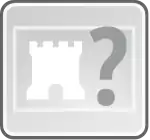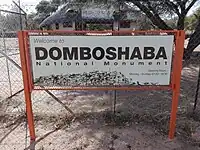Sites and monuments in Botswana
Botswana's most popular landmarks range from a group of large baobab trees to giant-size footprints fossilized in the rock. Other natural attractions include expanses of salt flats, the Kalahari desert and some very beautiful mountains.
| Monument identifier |
Description | Date in gazette as monument | Original function | Built | Location | Address | Comment | Coordinates | Image |
|---|---|---|---|---|---|---|---|---|---|
| Mamuno Monument a.k.a. Kangumene Rock Engravings |
2006[1] | Three rock engraving sites, with art works and engravings | 750 metres (2,460 ft) from the international border post at Mamuno | Ghanzi District | There are footprints, geometrical designs and weapons. The art found at the Mamuno sites is distinct from the Shamanistic form found in eastern Botswana. | 22°16′53″S 20°00′28″E |  Upload Photo | ||
| Gcwihaba Caves a.k.a. Rotsky's Caves |
The caves are imbued with myth, legend and spiritual significance for local communities, which also use them for income generating activities. | North West Botswana in the Ngamiland District.[2] | 20°01′23″S 21°21′19″E |  Upload Photo | |||||
| Domboshaba | It was occupied towards the end of the Great Zimbabwe period (1250-1450AD). It was a regional centre in the Khami phase (1450-1690AD) | Northeast District | 20°40′00″S 27°25′00″E |  | |||||
| Old Palapye | Has the remains of the Ngwato capital, which was established there in 1889, during the reign of the famous Kgosi Khama III | Tswapong area in Eastern Botswana. | It was one of the largest towns in Southern Africa in 1889, with about 30000 inhabitants | 22°34′00″S 27°18′00″E |  Upload Photo | ||||
| Kolobeng | One of the early churches and formal schools in Botswana | Kweneng District | First western medical doctor practiced here | 24°39′16″S 25°39′55″E |  Upload Photo | ||||
| Majojo | Residence of a chief or "Kgosi", between 1300-1650AD | Central District. |  Upload Photo | ||||||
| Matsieng a.k.a. Creation Sites |
Kgatleng District, near Rasesa village |  Upload Photo | |||||||
| Tsodilo Hills | NorthWest | There are certain myths revolving around the history of these hills. |  Upload Photo |
References
- Thebe 2011, p. 152.
- "Gcwihaba Caves". UNESCO. Retrieved 26 September 2020.
Sources
- Thebe, Phenyo Churchill (2011). "Contract Archaeology in Botswana: The Case of the Botswana Development Corporation Lodge Project at Mamuno". Botswana Notes and Records. 43: 151–164. JSTOR 23237963. Retrieved 26 September 2020.
This article is issued from Wikipedia. The text is licensed under Creative Commons - Attribution - Sharealike. Additional terms may apply for the media files.